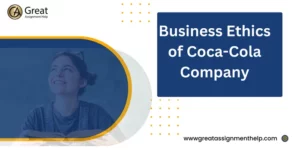The business ethics of the Coca-Cola Company are about doing the right thing. They’re working to make their drinks healthier and reduce waste. They also support local communities and aim to be more sustainable. This shows they care about people and the planet, not just profits.
Coca-Cola is one of the largest soda corporations in the world, founded in 1892 in Wilmington, Delaware. Currently, the company is headquartered in Atlanta. Besides its signature drink, Coca-Cola also manufactures, retails, and markets a wide range of non-alcoholic aerated beverage concentrates and syrups such as Coke, Fanta, Sprite, etc. This American beverage brand’s main competitor is Pepsi-Cola. However, due to the great implementation of ethical principles and the code of ethics, Coca-Cola has managed to maintain its top brand label despite some ups and downs. Would you like to know the business ethics of the Coca-Cola Company? If yes, then continue reading this blog. Here, we have discussed Coca-Cola’s ethical norms, the common ethical problems it faces, and the ways it effectively overcame the difficulties.
In general, the Coca-Cola Company has very high ethical and social standards that apply not only to employees but also to other stakeholders such as the board of directors, suppliers, and so on. The fundamental reason for this is to set a good example and learn from past blunders that nearly destroyed Coca-Cola’s brand.
As per Coca-Cola’s Code of Conduct Report, 2016, the most essential work policy within the corporation is to develop an ethical business culture to ensure honesty and integrity. Their goal is to instill an ethical business culture across the whole Coca-Cola chain. The company will periodically revise these guidelines to ensure that they reflect global best practices that promote accountability.
Also Read: Why is Marketing Important for a Business?
Ethical Principles of Coca-Cola

Throughout the company’s history, the most significant policy principles have been to conduct business in good faith and with honesty in compliance with moral, ethical, and legal norms. Especially, to support this long-term philosophy, the company’s management adopted the Code of Business Conduct and Code of Ethics, which applies to all employees in the company’s domestic and international subsidiaries and operations. These guidelines are present on coca-colacompany.com, and they impose several regulations governing the improvement of a culture of ethics among managers and their compliance with suitable behavior criteria. Also, the company’s ethical norms govern decision-making.
Coca-Cola has a Compliance Office similar to the majority of multinational corporations. For instance, Coca-Cola Bottlers Japan Holding Group has established a dedicated phone number or email address for its Ethics and Compliance Hotline.
Coca-Cola’s Ethical Values
The following are some ethical values of Coca-Cola.
- Stay loyal to core values at all times. Do the correct thing and what is right, not what is easiest, based on the standard principles.
- Improving the quality of everything produced. Working rapidly and cheerfully.
- Learning and growing. Hearing the perspectives of other people and eagerly absorbing new information.
- Taking good care of workers. Believing in them fosters reciprocal growth and trust.
- Coca-Cola is a single team. The only thing that will produce the best outcome is teamwork and everyone’s participation in reaching the objective.
- Customers must be satisfied because they are the foundation of all actions.
Primary Objectives of Coca-Cola
The company operates based on a few very basic concepts. It ensures:
- Excellent taste
- High-quality items
- Top-class service
The main objectives of the Coca-Cola Company can be divided into numerous categories. Each of them contributes significantly to the company’s productivity and long-term growth. This is what secures the brand’s bright future:
- Developing commercial partnerships and trustworthy relationships with all customers
- To quench the customer’s thirst
- To improve living conditions for those residing in the nation in which the business operates
- Paying workers a fair wage and rewarding stockholders fairly
What are the outcomes of Code compliance? Coca-Cola has clearly shown what can be accomplished if not only quality products are produced but also ethical and moral standards are followed. For over a century, the company has been a pioneer in the application of innovative techniques.
Also read: List of Interesting Ethics Topics
Major Ethical Problems Faced by Coca-Cola
Throughout the company’s history, conflicts and issues have frequently surfaced despite the strict guidelines outlined in the code. It has faced serious issues with the company’s reputation and ethical concerns in the last few decades. Some investors have even lost faith in the company as a result of this. For example, back in 2006, board member and investor Warren Buffett quit Coca-Cola because the company was unable to solve its challenges.
Since the 1990s, the company has been facing numerous accusations. It includes the following
Disputes with distributors
Coca-Cola got a lawsuit from 54 American bottlers in 2006. Coca-Cola and the Coca-Cola Enterprises (CCE) block were the focus of the litigation. The purpose was to boycott the direct supply of beverage supplies to Walmart facilities. Bottlers recognized the issue of deviating from the custom of delivering drinks straight to retail locations. A year later, the parties negotiated an agreement, the terms of which were not made public. Only a portion of deliveries to the warehouse were deemed acceptable. Moreover, the media does not focus on Coca-Cola’s relationships with suppliers, partners, and distributors while resolving disputes.
The most important factor is the company’s reputation and strategic collaboration. If the company’s reputation declines, everyone in the supply chain suffers. Coca-Cola’s issue has had an impact on stakeholders, business partners, and the company’s financial performance.
Health Issues
For instance, because of its high sugar content, the company has been accused of contributing to the rising obesity crisis. Another problem was criticism of the potential impact of some Coke chemicals on the development of cancer. According to the Center for Science in the Public Interest (CSPI), Coca-Cola products containing caramel dye may be the source of the illness. However, CSPI did not offer any verifiable proof of this. Particularly, to prevent more such health issues, Coca-Cola and Pepsi changed the formula of their beverage and removed the harmful ingredients.
Unethical Behavior towards Trade Union Workers
Coca-Cola faced severe accusations in Guatemala and Colombia. At a Colombian bottling plant, eight workers were killed, around 50 workers fled, and another 65 were threatened with physical violence. Also, there was evidence of union members being intimidated. Coca refuted all charges and blamed the deaths of workers on Colombia’s civil war. Human rights advocates, environmentalists, and student activists started protests in New York as a result of these issues.
Several other ethical problems faced by Coca-Cola include
- Charges of inappropriate business practice
- Lack of competitiveness
- Excessive depletion of natural resources
- Racial discrimination among employees
- Environmental problems
Business Ethics of Coca-Cola Company
Over the years, the Coca-Cola Company has resolved numerous ethical problems. As a result of the reduction in market facilities, its business activities have slowed, and profits have been lost. These concerns have had a significant impact on the company, resulting in a loss of reputation and poor economic performance.
Accusations were on the company regarding its contribution to environmental pollution. Particularly, Indian villages accused the corporation of depleting groundwater in the area, which could cause future water shortages. According to the residents, the company also caused other types of pollution, such as land and air pollution. Therefore, the pollution control board of Kerala, India, ordered the business to close the facility (Pride, Hughes, & Kapoor, 2010).
Another ethical concern was discovered in Belgium in 1999 when schoolchildren felt unwell after drinking Coca-Cola products. The corporation took this as a minor issue, resulting in the withdrawal of the company’s products from Belgium. The corporation sold the prohibited cans to Africa without incident. The media created awareness among the public about the illegal sale of cans to Africa. Consumers were outraged, claiming that the company’s decision to export defective products to Africa was unethical. They saw this as racial prejudice and withdrew their stock from the corporation. The corporation lost half of its share value (Kidd, 2007). Consumers contended that cans make up 10% of the product while the brand makes up 90% of the product, causing the company’s brand to decline. By distributing tainted cans to Africa, the corporation damaged its brand.
Also read: List of Ethical Essay Topics
Conclusion
So far, in this blog, we have seen the business ethics of the Coca-Cola Company. In the world, Coca-Cola is one of the most popular soft drink companies that manufactures well-known drinks such as Diet Coke, Sprite, Fanta, etc. However, the establishment of the business and its moral standards took time. Especially, after the occurrence of numerous historical occurrences, the brand started to understand its social responsibility and tried to solve all the ethical issues raised. Also, Coca-Cola adheres to anti-corruption and anti-bribery legislation, which improves the company’s business ethics. Furthermore, Coca-Cola has signed the United Nations Global Compact “Caring for Climate: The Business Leadership Platform” to reduce emissions and promote energy efficiency. If you want to gain more insights on this topic, take our business management assignment help services. The professionals from our team will offer customized support to meet your needs.



